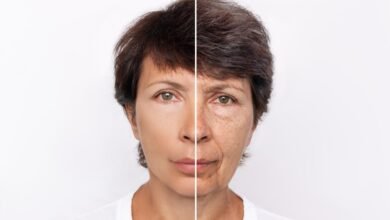Use Chia Seeds for Weight Loss in 2023

Discover how to use chia seeds for weight loss in 2023. Learn about the benefits, nutritional profile, and ways to incorporate chia seeds into your diet. Combine them with other effective weight loss strategies for optimal results. Start your weight loss journey with chia seeds today.
Weight loss has always been a popular topic of discussion and desire for many people. Achieving and maintaining a healthy weight not only improves physical appearance but also contributes to overall well-being and reduces the risk of various health issues. In recent years, chia seeds have gained significant attention as a potential aid in weight loss efforts. This article aims to provide valuable insights into using chia seeds for weight loss in 2023.
Read More: 9 Best Cardio Exercises for Weight Loss
Understanding Chia Seeds
Before diving into the weight loss benefits of chia seeds, let’s understand what chia seeds are. Chia seeds are tiny, oval-shaped seeds that come from the plant Salvia hispanica, which is native to Mexico and Guatemala. These seeds have a remarkable nutritional profile, making them a popular choice among health-conscious individuals.
Chia seeds are rich in essential nutrients such as fiber, protein, healthy fats, vitamins, and minerals. They are particularly known for their high omega-3 fatty acid content, making them an excellent plant-based source of this beneficial nutrient. Additionally, chia seeds are gluten-free, making them suitable for individuals with gluten sensitivities or celiac disease.
Chia Seeds and Weight Loss

Chia seeds can be a valuable addition to a weight loss plan due to several reasons. Firstly, their high fiber content can promote a feeling of fullness and reduce overall calorie intake. When consumed, chia seeds absorb liquid and expand in the stomach, creating a gel-like consistency that contributes to a sense of satiety. This can prevent overeating and unnecessary snacking, which are common hurdles in weight loss journeys.
Moreover, chia seeds have the ability to regulate blood sugar levels. The gel-like substance formed by chia seeds in the digestive system slows down the breakdown of carbohydrates, leading to a more gradual release of sugar into the bloodstream. This helps in preventing sudden spikes and crashes in blood sugar, which can lead to cravings and overeating.
Furthermore, the fiber in chia seeds promotes healthy digestion by supporting regular bowel movements. Adequate fiber intake is crucial for maintaining a healthy gut and preventing constipation, which can hinder weight loss efforts. By aiding in digestion, chia seeds contribute to the overall well-being of the digestive system.
Incorporating Chia Seeds into Your Diet

Adding chia seeds to your diet is simple and versatile. They can be consumed in various ways, providing a nutritional boost to your meals and snacks. Chia seeds can be sprinkled over yogurt, oatmeal, or salads, or added to smoothies and baked goods. They can even be used to make delicious chia seed puddings by mixing them with a liquid of your choice, such as almond milk or coconut milk.
To make a basic chia seed pudding, combine 2 tablespoons of chia seeds with 1/2 cup of your preferred liquid and sweeten it with a natural sweetener like honey or maple syrup. Allow the mixture to sit for at least 30 minutes or overnight in the refrigerator, and enjoy a nutritious and satisfying treat.
Combining Chia Seeds with Other Weight Loss Strategies
While chia seeds offer several benefits for weight loss, it’s essential to combine their consumption with other effective weight loss strategies for optimal results. A balanced diet that includes a variety of nutrient-dense foods and proper portion control is crucial. Chia seeds can serve as a valuable component of a well-rounded meal plan, but they should not replace a balanced diet.
Regular physical activity and exercise are also vital for successful weight loss. Engaging in activities that elevate your heart rate and promote calorie burns, such as cardio exercises, strength training, or yoga, can complement the effects of chia seeds on weight loss. Remember to consult a healthcare professional before starting any new exercise regimen.
Staying adequately hydrated by drinking plenty of water throughout the day is another essential aspect of any weight loss journey. Chia seeds can absorb liquid and help keep you hydrated. Aim to drink at least 8 glasses of water daily to support your overall health and weight loss efforts.
Tips for a Successful Weight Loss Journey with Chia Seeds
To make the most of chia seeds in your weight loss journey, consider the following tips:
- Start with small quantities: Begin by incorporating a teaspoon or two of chia seeds into your meals and gradually increase the amount as you become more comfortable.
- Be consistent: Consistency is key when it comes to reaping the benefits of chia seeds. Incorporate them into your daily routine to experience their full potential.
- Monitor your progress: Keep track of your weight loss progress and adjust your chia seed consumption or overall diet as necessary. Every individual is different, so it’s important to find what works best for you.
Potential Side Effects and Precautions
While chia seeds are generally safe for consumption, it’s important to be aware of potential side effects and take necessary precautions. Some individuals may be allergic to chia seeds, so it’s recommended to start with small amounts and monitor for any adverse reactions.
Due to their high fiber content, chia seeds may cause digestive discomfort, especially if consumed in excess. It’s advisable to gradually increase your intake and ensure you drink sufficient water throughout the day to support healthy digestion.
If you have any underlying medical conditions or concerns, it’s always best to consult with a healthcare professional before making significant changes to your diet.
Conclusion
Chia seeds can be a valuable addition to your weight loss journey in 2023. With their impressive nutritional profile and weight loss benefits, they offer a natural and versatile option for those looking to shed extra pounds. By incorporating chia seeds into a balanced diet and combining them with other effective weight loss strategies, you can enhance your chances of achieving your weight loss goals.
So why not give chia seeds a try? Start by experimenting with different recipes and incorporating them into your meals and snacks. Embrace a holistic approach to weight loss, focusing on nourishing your body with wholesome foods and staying active. With consistency and determination, you can make 2023 the year you achieve your weight loss goals.
Read More: Scientists Find the Necessary Weight Loss Genes in Worms
FAQs
Can chia seeds alone help in weight loss?
Chia seeds can contribute to weight loss due to their high fiber content, but they should be combined with a balanced diet and regular exercise for best results.
How many chia seeds should I consume daily for weight loss?
A recommended daily intake of chia seeds is around 1-2 tablespoons, but it’s important to listen to your body and adjust the amount based on your individual needs.
Can chia seeds be used as a meal replacement?
Chia seeds are a nutrient-dense food, but they should not be used as a sole meal replacement. They can be incorporated into meals and snacks to enhance their nutritional value.
Are there any specific diets that work well with chia seeds for weight loss?
Chia seeds can be incorporated into various diets, including low-carb, vegan, and gluten-free diets. They provide a versatile and nutritious addition to any dietary approach.
Are there any age restrictions for consuming chia seeds?
Chia seeds are generally safe for consumption by individuals of all ages. However, it’s always best to consult with a healthcare professional before introducing them to a child’s diet.







